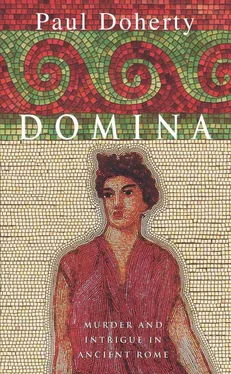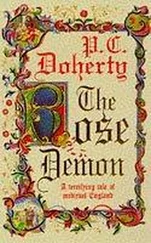Paul Doherty - Domina
Здесь есть возможность читать онлайн «Paul Doherty - Domina» весь текст электронной книги совершенно бесплатно (целиком полную версию без сокращений). В некоторых случаях можно слушать аудио, скачать через торрент в формате fb2 и присутствует краткое содержание. Год выпуска: 2012, ISBN: 2012, Издательство: Headline, Жанр: Исторический детектив, на английском языке. Описание произведения, (предисловие) а так же отзывы посетителей доступны на портале библиотеки ЛибКат.
- Название:Domina
- Автор:
- Издательство:Headline
- Жанр:
- Год:2012
- ISBN:9780755350490
- Рейтинг книги:3 / 5. Голосов: 1
-
Избранное:Добавить в избранное
- Отзывы:
-
Ваша оценка:
- 60
- 1
- 2
- 3
- 4
- 5
Domina: краткое содержание, описание и аннотация
Предлагаем к чтению аннотацию, описание, краткое содержание или предисловие (зависит от того, что написал сам автор книги «Domina»). Если вы не нашли необходимую информацию о книге — напишите в комментариях, мы постараемся отыскать её.
Domina — читать онлайн бесплатно полную книгу (весь текст) целиком
Ниже представлен текст книги, разбитый по страницам. Система сохранения места последней прочитанной страницы, позволяет с удобством читать онлайн бесплатно книгу «Domina», без необходимости каждый раз заново искать на чём Вы остановились. Поставьте закладку, и сможете в любой момент перейти на страницу, на которой закончили чтение.
Интервал:
Закладка:
‘Some say she’s a courtesan,’ Pallas replied. ‘Others claim she lives a chaste life, which will appeal to our Emperor. Apparently Seneca brought her into Rome and persuaded his friend Serenus to set her up in a house in a fashionable district. The young woman has been paraded before Nero like a prize mare. If rumour is to be believed, Nero’s interest in her is growing by the day.’
‘But all Emperors have favourites,’ I replied. ‘Nero is only seventeen, it will just be a passing infatuation.’
‘Oh, it will pass all right,’ Pallas agreed. ‘But Nero’s youth is his very weakness: he’s determined to show his mother that she’s no longer the most important woman in his life; that he loves Acte, or someone else, more than he does Agrippina.’
I could see where Pallas was leading. Agrippina was truly vulnerable. She adored her son and, for the first time ever, would experience the pangs of jealousy.
‘Now we come to the purpose of this meeting.’ Pallas picked up a stack of coins and tossed them from hand to hand. ‘If Agrippina can be persuaded to keep her temper, to ignore Seneca’s provocation, to maintain a still tongue. .’
‘All will be well,’ I finished.
‘All will be well. If Agrippina attacks, however. .’ He threw the coins on the table. ‘Then the game is lost.’
I left the treasury with Pallas’s warnings ringing in my ears. On that same day I begged for an interview with Agrippina and warned her exactly what Seneca was plotting. She laughed at my worries but promised to heed my advice, although I could see it was already too late. When I mentioned Acte, red spots of anger appeared high in her cheeks and her eyes narrowed. The damage was already done.
‘You could try and remove Seneca?’ I suggested.
‘Impossible.’ She shook her head. ‘If I have made one mistake in life, Parmenon-’ She smiled. ‘What am I saying? I’ve made many — Seneca must rank as my greatest. I’ll heed what you say.’
She brought the interview to an end and was already at the door when she called my name.
‘Tell me, Parmenon, do you think Narcissus was mocking me with those games, that banquet?’
‘I don’t think so, Domina, I know. He may be a wounded animal but Narcissus is still dangerous.’
Agrippina kept her head down. ‘Wounded you say? Thank you, Parmenon.’
A few days later Narcissus was taken ill on a journey. He had barely left the city when the slaves heard moans and thrashing coming from the litter. They pulled back the curtain, to discover Narcissus hardly breathing, his skin clammy and cold, complaining of pains throughout his body. They hurried him back to Rome but it was too late, and Narcissus died, strangely enough close to Messalina’s tomb. Seneca sent Praetorians to his house, to search for papers and certain letters, but to his fury all they found were charred fragments: Narcissus, or someone else, had taken great pains to destroy any incriminating documents.
Narcissus’s funeral rites were barely over when Nero despatched a letter to Pallas thanking him for his hard work at the treasury, and pointing out that, as the burdens of state must be affecting Pallas’s health, it was time he retired. Pallas had no choice but to agree. He left in style with an escort of German guards, the personal retinue of Agrippina, walking before him, as he sat enthroned in a litter. Eight Abyssinians carried it shoulder high whilst his servants and friends, slaves and household retainers trooped behind in a solemn procession. Nero watched him go, standing on the top step of the treasury. He waved goodbye, waggling his fingers as if Pallas was a fellow pupil leaving a school.
‘Take care!’ the Emperor cooed.
In one quick stroke Seneca had removed Agrippina’s most powerful and loyal ally. He returned to the attack. Acte appeared more and more in the Emperor’s retinue, and Nero singled her out for pleasant, private conversations, and quiet supper parties — just the two of them — followed by night walks in the gardens. He showered her with costly gifts, and granted her a suite of apartments in the imperial palace. Nero stopped visiting his mother as often as she wished, and even worse, when Nero wanted to be alone with Acte, Agrippina was shown the door.
Agrippina became like a woman obsessed. Unable to sleep, she neglected affairs of state, and spent most of her waking hours railing at Acte and her son’s ingratitude.
‘What am I to do, Parmenon?’ she cried.
‘Nothing,’ I replied. ‘Domina,’ I fell on my knees before her, ‘Acte is not Narcissus, an enemy to be removed. Let your son have his way. Leave Rome for a while.’
It was the only time Agrippina ever struck me in anger. She refused to listen and instead ordered me from of her presence. I waited in the antechamber, hoping she would regret her actions. Suddenly the door to her chamber flew open and Agrippina swept out, her maids running behind her. She walked like a general down the galleries and corridors, to where Nero was drinking with a small party of friends. Bursting in, she openly confronted her son.
‘See,’ she shouted, pointing at Acte lying on a couch next to Nero, ‘what a spectacle my son offers to Rome! Nero the Emperor!’ she sneered. ‘Like a doting, old man lying at the feet of a former slave: a woman who can be bought to give a man an hour of pleasure!’
Agrippina stood in the doorway, as I and the other servants huddled behind her. She was beyond all reason.
‘Look at her!’ Agrippina shouted. ‘She’s nothing more than a painted whore but the Emperor of Rome has made her his official mistress. Is it for this that I made you Emperor, the legitimate heir of Claudius?’ She turned on Seneca who was lying on the couch to Nero’s left. ‘I thought I was choosing a tutor, the wisest man in the whole Empire, but in truth, I picked a fool. His student, my son, fornicates with a freedwoman whilst Octavia, his proper wife, is neglected and repelled and I, Germanicus’s daughter, am insulted and ignored!’
She stopped, shoulders heaving. She put a hand out and leaned against the lintel. Nero’s guests stared in disbelief, a frozen tableau in some play. Acte kept her head down, and Seneca looked astonished, his eyes screwed up in mock hurt. Nero had the measure of his mother. He picked up that emerald eye-glass and examined her closely.
‘Why, Mother? What is the matter? Have you been drinking? As you know, I invited you here this evening but you said you were unable to come.’ He shifted his gaze. ‘Is that you, Parmenon? Take my mother back to her apartments. She’s overcome with exertion.’ He let the eye-glass drop on its silver chain and waved his hand. ‘Now, leave!’
Agrippina withdrew. I tried to seize her by the arm, but she shook me off. Behind the closing doors I heard muffled conversation and the sound of laughter. Agrippina walked slowly back to her chamber. She dismissed the maids and spent the rest of that night pacing up and down, pondering her next move.
The following day Nero added insult to injury: he opened the storerooms of the palace where the jewels and ornaments were kept, and chose from the treasure an exquisite headdress and pendant which he sent as gifts to his mother. I was with Agrippina when they arrived. She had been trying to calm her rage by dictating letters to stewards and bailiffs on her estates outside Rome. When the servants presented the gifts, she knocked them out of their hands.
‘Tell my son,’ she hissed, ‘that everything he possesses actually belongs to me! He is only sending me what is already mine!’
I attempted to reason with Agrippina but she was possessed by anger. All she was conscious of was her waning influence over her son and the hated presence of Acte. Nero now decided to twist the cord a little tighter, telling her that in view of his love for Acte he might divorce Octavia and marry his new love, abdicate as Emperor and retire to Rhodes to live as a private citizen. The barbs struck home: he was rejecting Agrippina and everything she had worked for.
Читать дальшеИнтервал:
Закладка:
Похожие книги на «Domina»
Представляем Вашему вниманию похожие книги на «Domina» списком для выбора. Мы отобрали схожую по названию и смыслу литературу в надежде предоставить читателям больше вариантов отыскать новые, интересные, ещё непрочитанные произведения.
Обсуждение, отзывы о книге «Domina» и просто собственные мнения читателей. Оставьте ваши комментарии, напишите, что Вы думаете о произведении, его смысле или главных героях. Укажите что конкретно понравилось, а что нет, и почему Вы так считаете.












